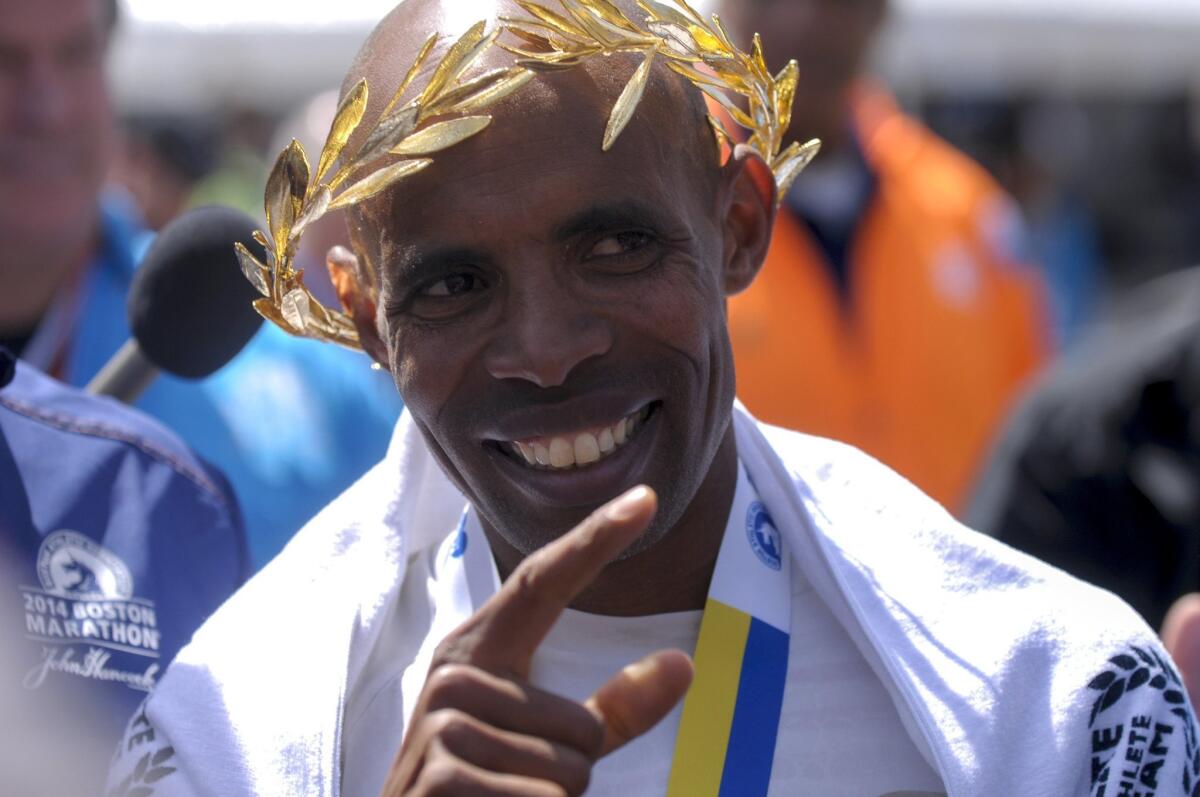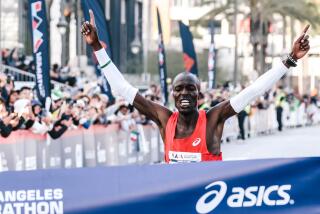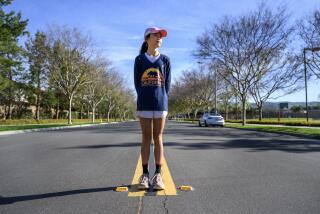Meb Keflezighi makes history and a statement in Boston Marathon

- Share via
BOSTON — Before Meb Keflezighi embarked on the 26.2-mile journey Monday to become the first American man to win the Boston Marathon since 1983, he wrote four names on his yellow race bib.
Martin, for Martin Richard.
Krystle, for Krystle Campbell.
Ling, for Lu Lingzi.
Sean, for Sean Collier.
The first three died in the bombings that occurred near the finish line of last year’s race. The last was shot and killed, investigators said, by one of the alleged bombers.
“It could’ve been me, my wife or me watching as a spectator,” said Keflezighi, a 38-year-old UCLA graduate.
The four names scrawled in black marker permeated Keflezighi’s 2 hours 8 minutes 37 seconds winding past chants of “USA!” and “Boston Strong” T-shirts. On a day when almost 36,000 runners started the race shadowed by heightened security and even more emotion, he provided a fitting ending.
Last year, an injury kept Keflezighi out of the race and in the grandstands on Boylston Street near the finish line. He departed five minutes before the first pressure-cooker bomb exploded.
This time he repeated that popular mantra, “Boston Strong,” and his own invention — “Meb Strong” — to spur himself on. As he fought to maintain a sizable lead during the race’s final miles, his thoughts turned to the names on the bib between prayers for the strength to finish.
In the process, Keflezighi delivered the first Boston victory by an American man since Greg Meyer in 1983.
“It couldn’t happen at a better time to win for the United States,” Keflezighi said.
A sore hamstring made the prospect of an all-out surge for the finish unwise. So, Keflezighi and his coach, Bob Larsen, focused on maintaining an even pace throughout the race. By 17 miles, Keflezighi owned a lead that assured no dramatic finish would be necessary. Nerves still lapped at him during the slog through the four Newton hills, though. Sometimes, Keflezighi admitted, others believe in him more than he does in himself. So, he repeatedly glanced behind and reminded himself to conserve energy for a dash to the finish. He expected a challenge that never materialized.
The pack, including second-place finisher Wilson Chebet of Kenya, failed to reel him in. Even a wave of nausea 22 miles in didn’t throw off Keflezighi.
“I always told people I thought he could do really well on this course,” said Larsen, who believed this was the strongest men’s field in a marathon that started in 1897. “We couldn’t have scripted this any better.”
Raised in San Diego after escaping from Eritrea with his family at 12 years old, Keflezighi’s 2010 autobiography is titled “Run to Overcome.” That sums up much of his career. Highs included a silver medal in the marathon at the 2004 Olympics and winning the New York City Marathon in 2009. The other side included going seven months without a shoe sponsor after Nike dropped him in 2011. He even considered retirement.
Instead, Keflezighi kissed the pavement and wept after he crossed the finish line. Later, still wearing the winner’s laurels, he talked about trying for the Olympics in 2016. He talked about the 11 companies that now sponsor him. He talked about being most comfortable in front. He talked about history.
Behind every grin and quip, however, the finality of the four names on his race bib lingered.
“This is for the victims,” Keflezighi said. “We can’t get them back.”
More to Read
Go beyond the scoreboard
Get the latest on L.A.'s teams in the daily Sports Report newsletter.
You may occasionally receive promotional content from the Los Angeles Times.











